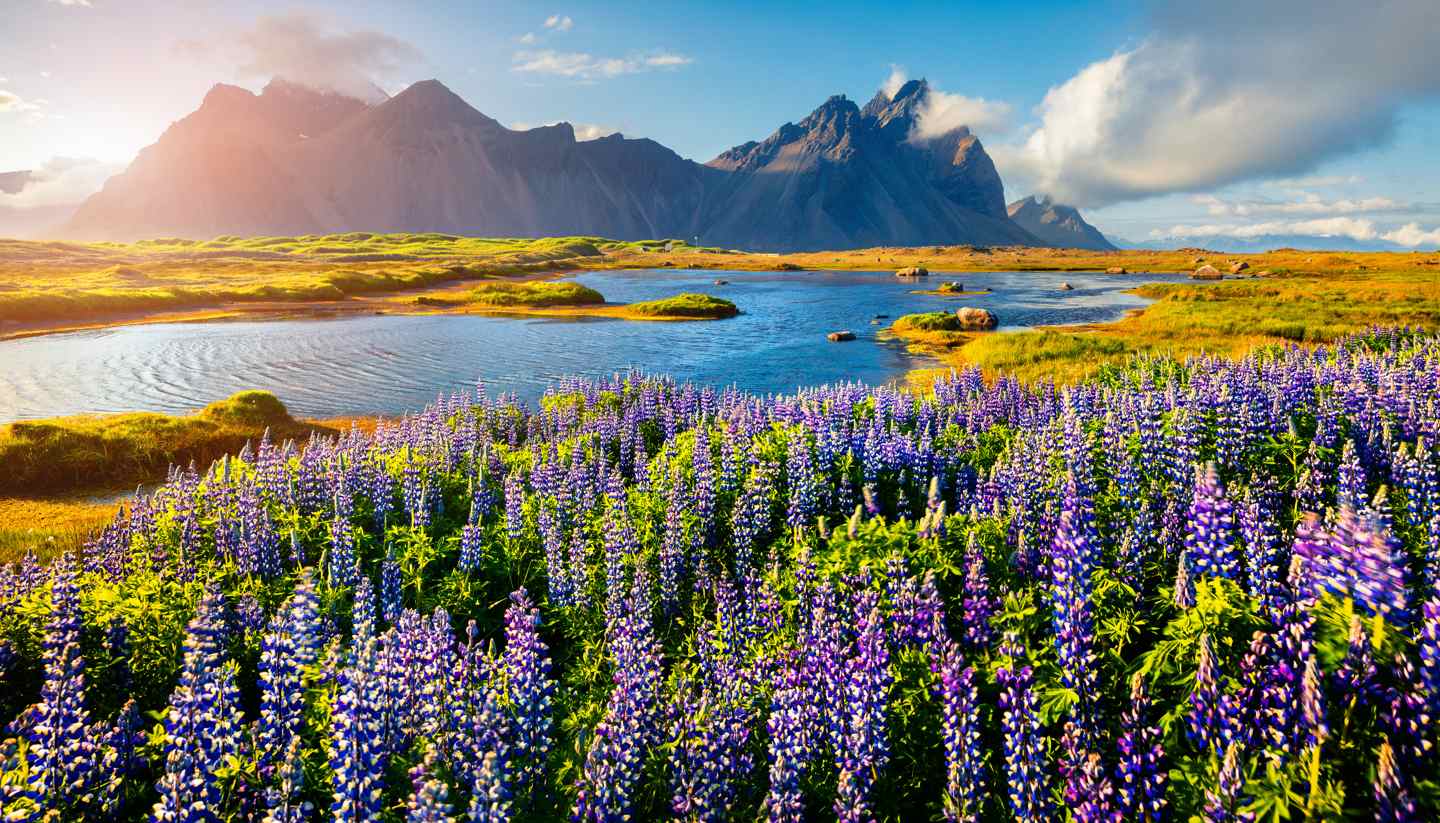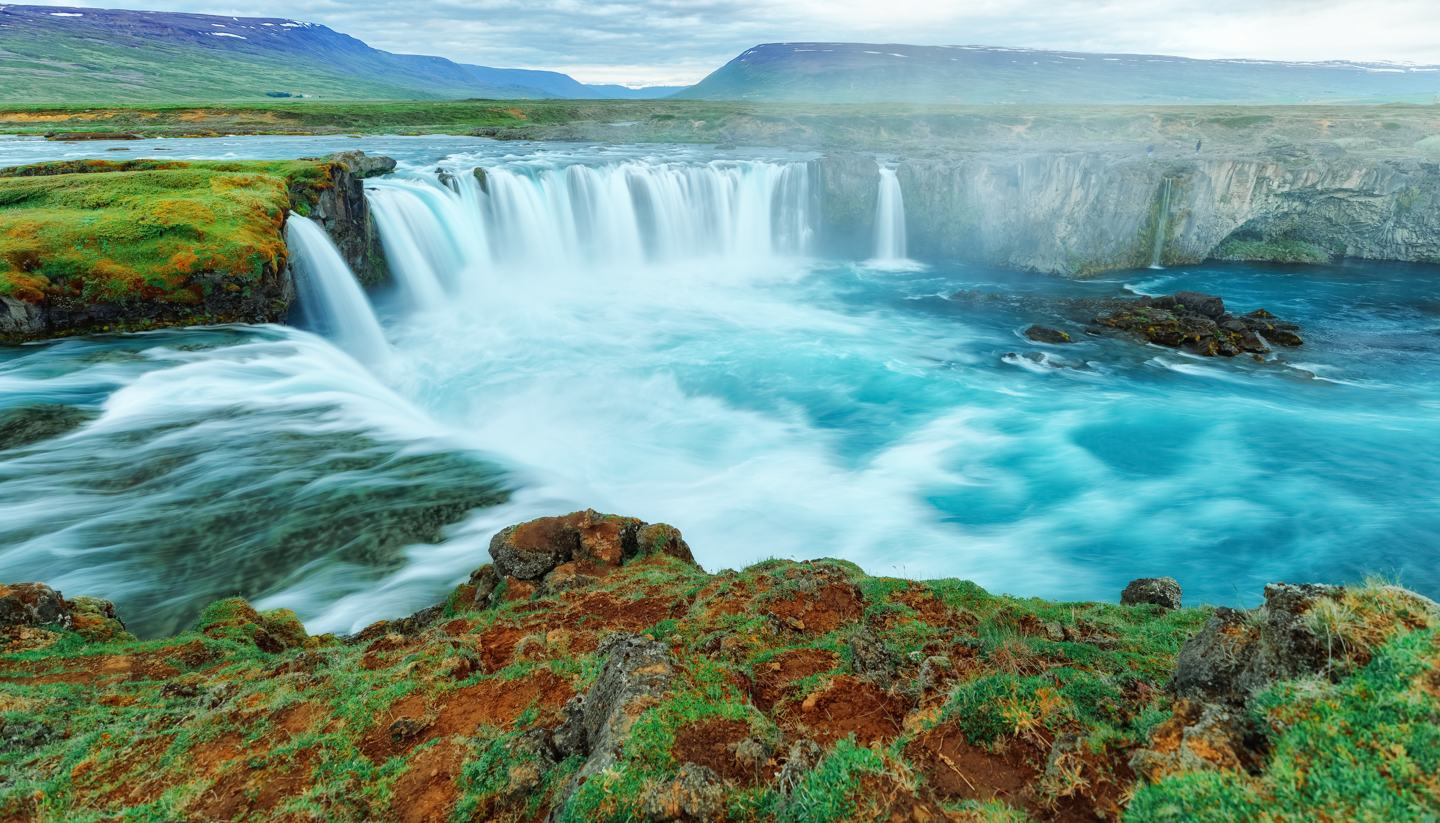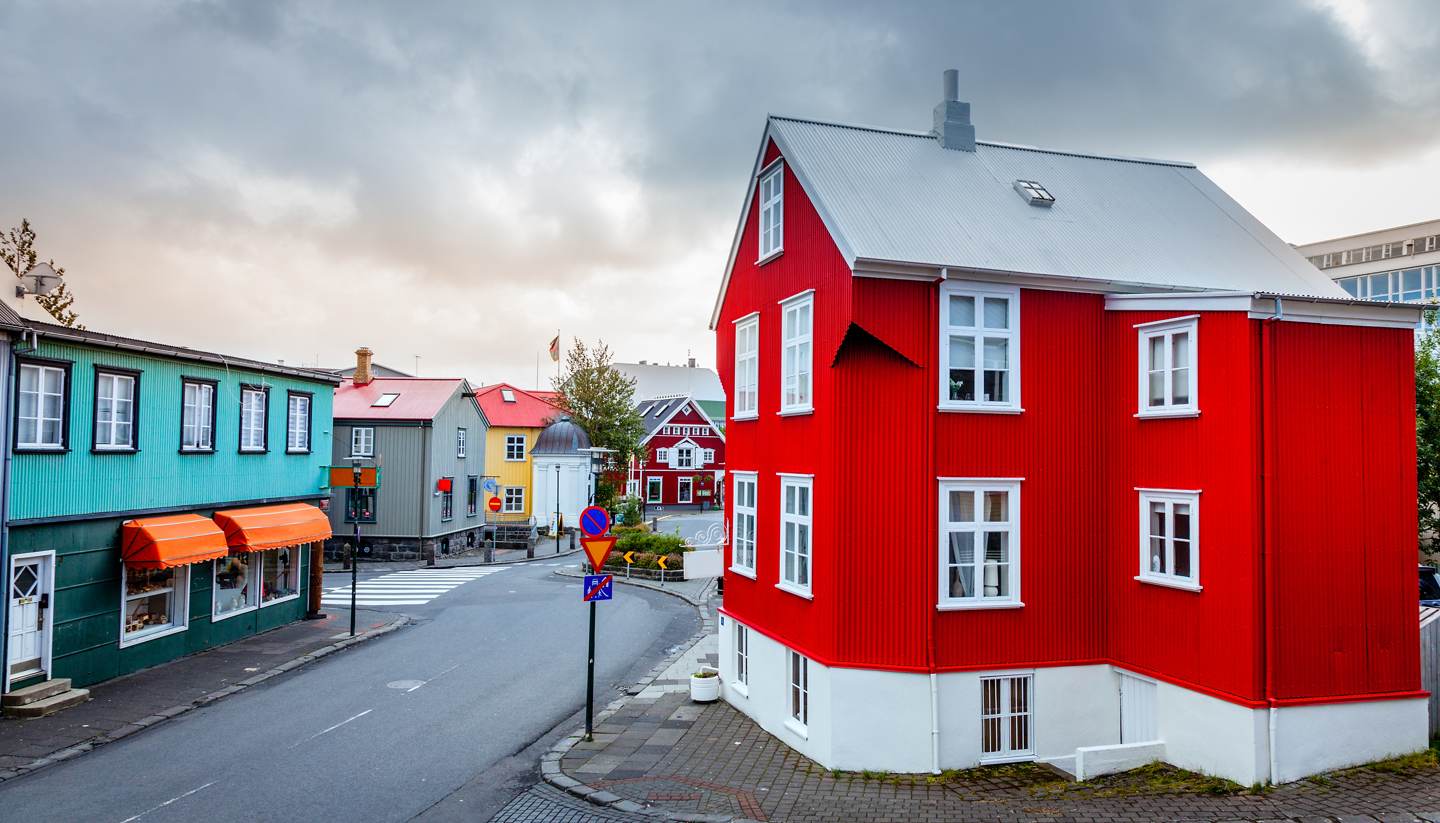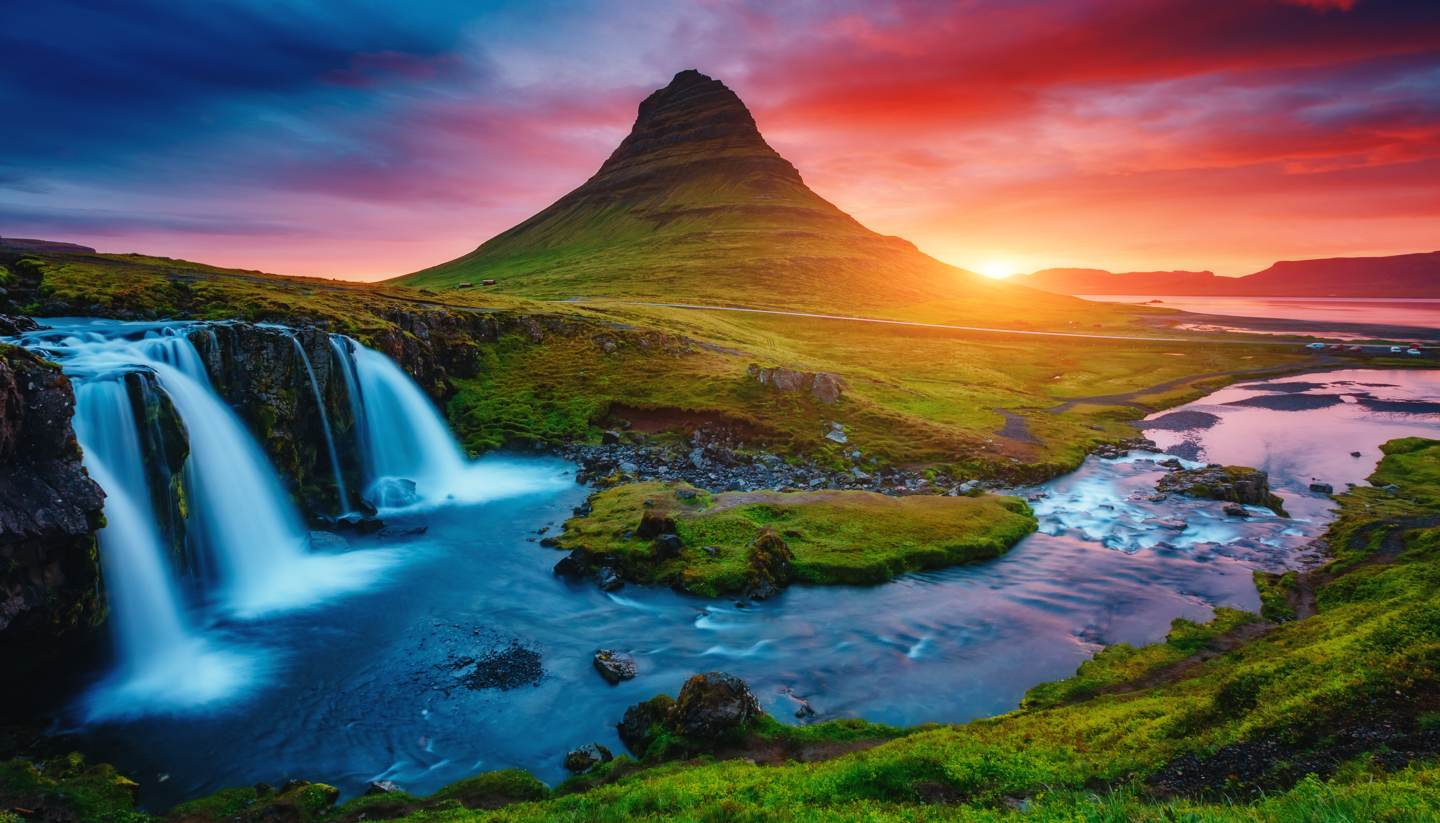Iceland travel guide
About Iceland
A country of extreme geological contrasts, Iceland has built up an impressive tourism sector with over 2 million visitors a year flocking to see its moss-covered lava fields, glacier-fed ice caves, rock-ribbed coast and ash-spouting volcanos.
Widely known as "the land of fire and ice", Iceland is crammed with magnificent scenery that delights and awes at every turn. The word fire in the phrase refers to Iceland's abundant volcanoes, which burst into life periodically. Elemental forces bubble just below the surface across the country, and clever Icelanders have long been accessing geothermal energy to generate electricity, heat tap water and warm up tomato greenhouses.
Volcanic tourism is also lucrative, with tourists taking trips to see bubbling fumaroles and soak in thermal springs. The two famous examples of the latter are the Blue Lagoon and Sky Lagoon near Reykjavík; both are geothermal spas that aim to soothe your aches and pains.
Ice is Iceland's other big draw (the clue is in the name) – more specifically, the dramatic glaciers that slice down towards the coast, calving icebergs into serene lagoons. About 11% of the country is covered in glaciers, with Vatnajökull being the largest and extending some 8,400km² (3,243mi²) in the southeast with thick layers of snow blanketing many high, majestic mountain ridges. Iceland's highest peak, Hvannadalshnjúkur (2,119m or 6,592ft) can also be found here. Guided tours to glaciers, ice caves and frozen waterfalls are widely available.
Reykjavík, Iceland's capital city, is where most travellers start their journey. This fun and vibrant city, with its many museums, marine excursions, and colourful nightlife, is certainly a worthy diversion.
So come to experience walking in a lava cave, climb a glacier, spot a whale, or catch the colourful northern lights in their full glory, undimmed by light pollution in the least densely populated nation in Europe. No matter what you do, a holiday in Iceland is an experience you'll remember for a lifetime.
Key facts
103,000km² (39,769mi²).
341,243 (2020).
3 per sq km.
Reykjavík.
Republic.
President Halla Tómasdóttir since 2024.
Prime Minister Kristrún Frostadóttir since 2024.
Travel Advice
Volcanic eruptions
Recently there has been a series of volcanic eruptions on the Reykjanes peninsula in south-west Iceland.
For more details see Extreme weather and natural disasters.
Before you travel
No travel can be guaranteed safe. Read all the advice in this guide. You may also find it helpful to:
- see general advice for women travellers
- read our guide on disability and travel abroad
- see general advice for LGBT+ travellers
- read about safety for solo and independent travel
- see advice on volunteering and adventure travel abroad
Travel insurance
If you choose to travel, research your destinations and get appropriate travel insurance. Insurance should cover your itinerary, planned activities and expenses in an emergency.
About FCDO travel advice
The Foreign, Commonwealth & Development Office (FCDO) provides advice about risks of travel to help you make informed decisions. Find out more about FCDO travel advice.
Get travel advice updates
Sign up to get email notifications when this advice is updated.
Follow FCDO:
This information is for people travelling on a full ‘British citizen’ passport from the UK. It is based on the UK government’s understanding of the current rules for the most common types of travel.
The authorities in Iceland set and enforce entry rules. If you’re not sure how these requirements apply to you, contact the Icelandic Embassy in the UK.
Passport validity requirements
Iceland follows Schengen area rules. Your passport must:
- have a ‘date of issue’ less than 10 years before the date you arrive – if you renewed your passport before 1 October 2018, it may have a date of issue that is more than 10 years ago
- have an ‘expiry date’ at least 3 months after the day you plan to leave the Schengen area (the expiry date does not need to be within 10 years of the date of issue)
Check with your travel provider that your passport and other travel documents meet requirements. Renew your passport if you need to.
You will be denied entry if you do not have a valid travel document or try to use a passport that has been reported lost or stolen.
Dual nationals
When returning to the UK, British citizens must carry a valid British passport or certificate of entitlement. See Dual citizenship.
Visa requirements
You can travel to the Schengen area, which includes Iceland, for up to 90 days in any 180-day period without a visa. This applies if you travel:
- as a tourist
- to visit family or friends
- to attend business meetings, cultural or sports events
- for short-term studies or training
The requirements for working in Iceland are different.
If you’re travelling to other Schengen countries as well, make sure your whole visit is within the 90-day visa-free limit. Visits to Schengen countries in the 180 days before you travel count towards your 90 days. If you overstay the 90-day visa-free limit, you may be banned from entering Schengen countries for up to 3 years.
Until the Entry-Exit System (EES) is fully rolled out, make sure you get your passport stamped on entry and exit (read ‘New Schengen entry requirements’).
If you’re a visitor, border guards will look at your entry and exit stamps to check you have not overstayed the 90-day visa-free limit for the Schengen area.
If your passport is missing a stamp, show evidence of when and where you entered or left the Schengen area (for example, boarding passes or tickets) and ask the border guards to add the date and location in your passport.
At Icelandic border control, you may also need to:
- show a return or onward ticket
- show you have enough money for your stay
Staying longer than 90 days in a 180-day period
To stay longer, to work or study, or for other reasons, you must meet the Icelandic entry requirements. Check what type of visa or work permit you need with the Icelandic Directorate of Immigration.
If you‘re in Iceland with a residence permit or long-stay visa, this does not count towards your 90-day visa-free limit.
Read about entry processes if you live in Iceland.
New Schengen entry requirements
The European Union’s (EU) new Entry/Exit System (EES) is being rolled out.
EES checks are being introduced in a phased way across external borders, with full operation expected from 10 April 2026.
This means that when you travel into the Schengen area for short stays, you may need to register your biometric details, such as fingerprints and a photo. You do not need to take any action before you arrive at the border, and there is no cost for EES registration.
On your first visit into a Schengen country, you may be asked to register your details at a special booth before proceeding to the immigration desk. Follow directions from your travel operator or the staff at your port of entry. You may also need to provide either your fingerprint or photo when you leave the Schengen area. Children aged 11 or younger will not have their fingerprints scanned but can be required to have their photo taken.
EES may take each passenger a few minutes extra to complete so be prepared to wait longer than usual at the border.
Until EES is fully rolled out your passport will continue to be stamped, even if you’ve already been registered for EES. Once EES is fully rolled out, it will replace the current system of manually stamping passports when visitors arrive in the Schengen area for short stays and you will input biometric details every time you enter or exit.
If you enter the Schengen area through the Port of Dover, Eurotunnel at Folkestone or Eurostar at St Pancras International and you are asked to register for EES, the information will be taken at the border before you leave the UK.
Your digital EES record is valid for 3 years. If you enter the Schengen area again during this time, you will still only need to provide a fingerprint or photo at the border, when you enter and exit.
Read more information on the EU Entry/Exit System and to understand which countries are in the Schengen area.
Vaccine requirements
For full details about medical entry requirements and recommended vaccinations, see TravelHealthPro’s Iceland guide.
Customs rules
There are strict rules about goods that can be brought into and taken out of Iceland. You must declare anything that may be prohibited or subject to tax or duty.
Whale products
It is illegal to import whale products from Iceland into the UK. You could get a fine of up to £5,000 or a prison sentence.
Taking money into or out of Iceland
You must declare if you’re carrying any currency worth 10,000 euros or more.
Taking food and drink into Iceland
You cannot take meat, milk or products containing them into Iceland. There are some exceptions such as powdered baby milk, baby food and special foods or pet feed required for medical reasons.
Terrorism
There is a high threat of terrorist attack globally affecting UK interests and British nationals, including from groups and individuals who view the UK and British nationals as targets. Stay aware of your surroundings at all times.
UK Counter Terrorism Policing has information and advice on staying safe abroad and what to do in the event of a terrorist attack. Find out how to reduce your risk from terrorism while abroad.
Terrorism in Iceland
Although there’s no recent history of terrorism in Iceland, attacks cannot be ruled out.
Crime
Crime levels are low but petty theft and antisocial behaviour can occur, particularly around bars in downtown Reykjavík. Take sensible precautions and keep your belongings safe.
Laws and cultural differences
Personal ID
You do not have to carry your passport with you, but it is sensible to have some form of ID, such as a photocard driving licence. You could also carry a copy of your passport’s photo page as ID. Keep your passport somewhere safe.
Smoking and e-cigarette bans
It is illegal to smoke or use e-cigarettes in restaurants, bars, public transport and public buildings, and you could get a fine.
Illegal drugs
Illegal drugs, even small amounts, including cannabis and khat carry severe penalties.
You should expect a long jail sentence and heavy fines for possessing, using or smuggling illegal drugs, including when transiting through the airport.
Airports in Iceland have excellent technology and security for detecting illegal items. This is also used to scan the baggage of transiting passengers.
LGBT+ travellers
Same-sex sexual activity is legal in Iceland and same-sex relationships are recognised in law.
Read more advice for LGBT+ travellers.
Outdoor activities and adventure tourism
Hiking, mountaineering and other adventure sports have specific risks.
You should:
- read the Safe Travel Iceland guides
- leave travel plans and contact details with your hotel, or on Safe Travel Iceland
- take a phone with you
Hiking and mountaineering
When hiking, choose a trail suited for your level of experience. Conditions in Iceland could be different to what you’re used to.
Going too close to the ocean, cliff edges and hot springs are common causes of accidents in Iceland.
Take enough food, equipment, clothing and emergency rations for the worst-case scenario. Use a map, compass, GPS and phone.
Transport risks
Road travel
If you are planning to drive in Iceland, see information on driving abroad and check the rules of the road in the RAC’s Iceland guide. The guide lists driving regulations and other legal requirements you need to be aware of or risk a sizeable fine up to £500. Follow speed limits, keep dipped headlights on year-round, and have suitable tyres, including tyres for winter weather when needed. Drink driving limits are also lower than the UK.
You can use a UK photocard driving licence to drive in Iceland for up to 30 days. If you still have a paper driving licence, you may need to update it to a photocard licence or get the 1968 version of the international driving permit (IDP) as well.
Hire car companies often have stricter requirements for their customers, such as a year of driving experience, a higher minimum age and holding an IDP.
If you bring your own car, check if you need a UK sticker to drive it outside the UK.
Driving conditions
Driving in Iceland can be very different to the UK, the weather can change quickly and make driving conditions challenging at times. Speed limits are lower than in the UK and the distances between towns are far greater.
Some main routes can be gravel or dirt tracks. Roads can be narrower than you might be familiar with. Some routes, including bridges, are only a single lane with passing areas. On gravel and loose surfaces, reduce your speed.
Many highland tracks are only open for a short part of the summer. Some roads, such as in the highlands or interior roads, require 4-wheel drive. Drive slowly (5 to 10 kilometres per hour) when you cross rivers. River levels can change quickly, even within the same day.
The weather can cause damage to rental cars that is not covered by insurance. Strong winds are common and can throw sand or ash up, damaging paintwork. British tourists have had to pay large amounts of money to repair damage to hire cars caused by sand and ash.
Breakdown recovery costs, especially in remote areas, can be high.
Check road and weather advice from the Icelandic Road Administration. They also have information on off-road driving, which is strictly controlled.
Electric Scooters
Riding a scooter after consuming alcohol is prohibited by law in Iceland. The same law as driving a car under the influence applies and will resort in a fine and or charges.
Extreme weather and natural disasters
Find out what you can do to prepare for and respond to extreme weather and natural hazards.
Volcanic eruptions and earthquakes
Volcanic eruptions and earthquakes are common in Iceland given the country’s geography. In the event of an eruption or wider seismic activity, always follow the latest advice issued by the authorities, including on areas to avoid and actions to take if air quality is affected.
Since December 2023, there have been a series of volcanic eruptions on the Reykjanes peninsula in south-west Iceland, the latest started on 16 July 2025. These eruptions have affected the town of Grindavik and the surrounding area. The capital city, Reykjavik, Keflavik International Airport and the rest of Iceland have not been affected by this series of eruptions.
It is likely that there will be further eruptions on the Reykjanes peninsula. You should closely monitor local media for updates and always follow the authorities’ advice on travel to, or near to, the area of an ongoing eruption. Gas pollution levels can quickly exceed dangerous levels in the immediate vicinity of an eruption site. Depending on weather conditions, while an eruption is ongoing gas pollution and volcanic haze may also spread beyond the immediate area so pay particular attention to local alerts and advice. Never attempt to walk on newly solidified lava as the surface crust can break without warning.
Regularly check for alerts and advice from:
- Icelandic Met Office
- Safe Travel Iceland
- Icelandic Environment and Energy agency on gas pollution
- the Icelandic tourist board
- Almannavarnir Facebook page
The Government of Iceland monitors all seismic and volcanic activity closely and infrastructure is robustly designed, but not all events can be anticipated and can pose risks to your travel plans. This could include travel delays and cancellations due to rock falls and landslides, sudden flooding, or poisonous volcanic gases near eruption sites.
Further information on volcanic eruptions and earthquakes in Iceland can be found from the following organisations:
- Icelandic Department of Civil Protection and Emergency Management – includes health and safety advice
- Icelandic Road and Coastal Administration
- Institute of Earth Sciences
- London Volcanic Ash Advisory Centre
- Icelandic National Broadcasting Service
Arctic travel
Iceland is in the Arctic Circle: emergency medical assistance and search and rescue may be limited in some areas. See Arctic travel safety advice.
Before you travel check that:
- your destination can provide the healthcare you may need
- you have appropriate travel insurance for local treatment or unexpected medical evacuation
This is particularly important if you have a health condition or are pregnant.
Emergency medical number
Dial 112 and ask for an ambulance.
Contact your insurance or medical assistance company quickly if you’re referred to a medical facility for treatment.
Vaccine recommendations and health risks
At least 8 weeks before your trip:
- check the latest vaccine recommendations for Iceland
- see where to get vaccines and whether you have to pay on the NHS travel vaccinations page
See what health risks you’ll face in Iceland, including biting insects and ticks.
Medication
The legal status and regulation of some medicines prescribed or bought in the UK can be different in other countries.
Read best practice when travelling with medicines on TravelHealthPro.
Healthcare in Iceland
FCDO has a list of medical providers in Iceland where some staff will speak English.
Health insurance cards
To get medically necessary state healthcare in Iceland, you can now use the Global Health Insurance Card (GHIC) or European Health Insurance Card (EHIC).
The NHS’s getting healthcare abroad webpage has details about:
- how to apply for a GHIC
- how to get temporary cover if you lose your card or it does not arrive in time
- who qualifies for a new EHIC instead of a GHIC
- what treatment counts as medically necessary
A GHIC or EHIC is not an alternative to travel insurance. You may have costs your GHIC or EHIC does not cover, including:
- changes to travel and accommodation bookings
- additional standard costs for treatment
- medical repatriation to the UK
- treatment that is ruled non-urgent
- private healthcare
- private clinics
There is also guidance on healthcare if you’re living in Iceland.
Travel and mental health
Read FCDO guidance on travel and mental health. There is also mental health guidance on TravelHealthPro.
The Foreign, Commonwealth & Development Office (FCDO) cannot provide tailored advice for individual trips. Read this travel advice and carry out your own research before deciding whether to travel.
Emergency services in Iceland
Telephone: 112 (ambulance, fire, police)
Safe Travel Iceland
If you’re travelling around Iceland, leave details of your travel plans with Safe Travel Iceland in case you need help from the Icelandic emergency services.
Contact your travel provider and insurer
Contact your travel provider and your insurer if you are involved in a serious incident or emergency abroad. They will tell you if they can help and what you need to do.
Refunds and changes to travel
For refunds or changes to travel, contact your travel provider. You may also be able to make a claim through insurance. However, insurers usually require you to talk to your travel provider first.
Find out more about changing or cancelling travel plans, including:
- where to get advice if you are in a dispute with a provider
- how to access previous versions of travel advice to support a claim
Support from FCDO
FCDO has guidance on staying safe and what to do if you need help or support abroad, including:
- finding English-speaking lawyers, funeral directors and translators and interpreters in Iceland
- dealing with a death in Iceland
- being arrested in Iceland
- getting help if you’re a victim of crime
- what to do if you’re in hospital
- if you’re affected by a crisis, such as a terrorist attack
Contacting FCDO
Help abroad
See how to get help from the UK government abroad including in an emergency.
Help in the UK
You can call FCDO in London if you need urgent help because something has happened to a friend or relative abroad.
Telephone: 020 7008 5000 (24 hours)
Get travel advice updates
Sign up to get email notifications when this travel advice is updated.
Follow FCDO:





